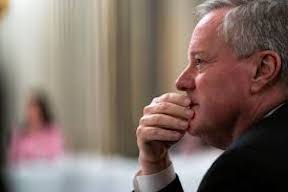White House wants more airline aid, Meadows says after meeting
President Donald Trump would support narrow legislation to provide more financial aid to airlines, White House Chief of Staff Mark Meadows said Thursday after meeting with industry executives.
Meadows said the industry needs $25 billion and that 30,000 to 50,000 jobs are at risk. Airlines have warned they plan mass reductions after an existing federal prohibition on job cuts expires at the close of business on Sept. 30.
Extending payroll assistance for airlines has been backed by members of both parties to avert politically treacherous layoffs a month prior to the U.S. elections, but so far there has been no agreement on how.
“I never thought I’d say $25 billion was a small number, but compared to $1.5 trillion, it’s a rather small amount of additional assistance that could potentially keep 30,000 to 50,000 workers on the payroll,” Meadows said.

“If we’re going to get something separate prior to that deadline, it’s going to have to happen next week,” he said of an airline-only bill. That would ensure it gets to Trump’s desk before layoffs begin on Oct. 1, he said.
House Speaker Nancy Pelosi has opposed doing “piecemeal” virus relief bills as part of her strategy for Democrats to win agreement on a large multitrillion relief measure. She violated that stance however when she called the House back into session during the August recess to vote on a $25 billion Postal Service bill in the wake of mail delays.
In August, 16 Republican senators signed a letter calling on leadership to add $25 billion in payroll funds in a package of Covid-19 assistance. Some Republicans opposed the measure and it wasn’t part of a stripped-down bill that failed to pass the chamber.
A bipartisan group of House lawmakers called for more airline aid to prevent layoffs in July.
The prospect of fresh assistance failed to immediately reassure airline investors. Most major U.S. carriers in a Standard & Poor’s 500 gauge fell Thursday, joining a retreat in broader equity markets. The index was off less than 1% at 10:26 a.m. in New York.
Carriers have been badly damaged by the coronavirus pandemic, which led many Americans to abandon air travel. After airline passenger counts surged somewhat around the close of summer and the Labor Day holiday, they’ve been declining in recent days.
U.S. airport security portals screened only 30% of the number of airline passengers in the past seven days compared to the total a year ago, according to the Transportation Security Administration. The seven-day average had reached 37% earlier in the month.
American Airlines Group Inc. said last month that it would cut 19,000 employees once federal payroll aid expires, capping a 30% workforce reduction since the coronavirus pandemic torpedoed travel demand. United warned of more than 16,000 cuts, saying it expected no meaningful recovery in demand until a treatment or vaccine is widely available.
Delta Air Lines Inc. said this week it would be able to avoid most layoffs until the summer of 2021 at the earliest, although the company remains in talks with its pilots on ways to reduce or eliminate furloughs for almost 2,000.
Delta declined to comment Thursday, as did American Airlines. United declined to comment and referred questions to Airlines for America, the airline lobby, which did not immediately respond to a request for comment.
A pair of aid packages were created earlier this year for the industry. One extended loans to the carriers, which few accepted. The other provided money to pay salaries of employees in exchange for no layoffs until at least October.
Five major airlines received the lion’s share of the aid, which Treasury Secretary Steven Mnuchin approved in May. American Airlines is the largest recipient, getting $5.8 billion in payroll assistance. The money was a combination of grants and loans.
Still, airlines including cargo carriers have so far left $29 billion in federal pandemic relief loans unclaimed as they wait to see whether consumer demand recovers as the economy reopens. Companies including American are in talks for the loans.
Most major carriers have signed “letters of intent” to take the funds, though several have said they do not need it after raising debt in private markets.
Similar Stories

American Airlines becomes only carrier to fly nonstop between Washington, D.C., and San Antonio
View ArticleOpen Skies agreement with the Dominican Republic enters into force
The U.S.-Dominican Republic Air Transport Agreement entered into force on December 19. This bilateral agreement establishes a modern civil aviation relationship with the Dominican Republic consistent with U.S. Open Skies…
View Article
WorldACD Weekly Air Cargo Trends (week 50) - 2024
View Article
Aeromexico now connects Miami with Cancun
View Article
EUROCONTROL Aviation long term outlook expects aviation to reach 15.4 million flights in 2050
View Article
Etihad Cargo adds Paris to freighter network with new weekly service
View ArticleGet the most up-to-date trending news!
SubscribeIndustry updates and weekly newsletter direct to your inbox!





